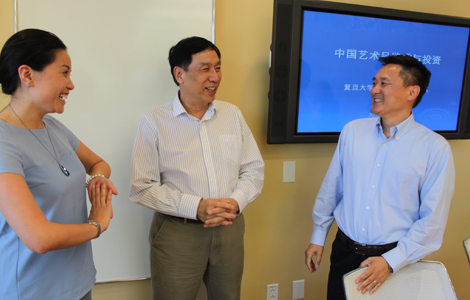Pakistanis adapt to everyday heightened security
Updated: 2013-08-06 07:14
By Zhang Yunbi (China Daily)
|
||||||||
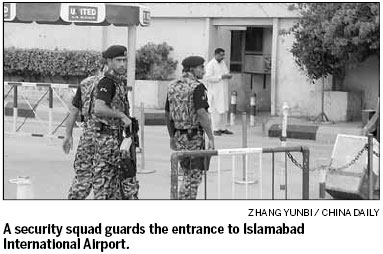

Roadblocks are almost everywhere in the Pakistani capital of Islamabad. It is a scene that reminds every visitor from abroad how everyday life has been profoundly reshaped by terrorist attacks.
After navigating the roadblocks, drivers approach checkpoints manned by local officers who conduct security checks to verify the identity of the people and their vehicles.
There are usually five roadblocks placed in an "S" pattern at each checkpoint to alert drivers that they need to slow down.
But the driver of our bus, a local man in his 60s with a white beard, is an expert in negotiating the difficult turns, and he drove through the roadblock quickly and safely, showing no signs of hesitation behind the wheel.
Anyone checking into a hotel or heading to a department store for a shopping spree must undergo security screening these days. It is compulsory, and a fact of life.
Even the five-star Serena Hotel, where British Prime Minister David Cameron stayed in late June, has installed a series of roadblocks at the entrance.
Local residents seem to have become accustomed to the security routine. Shoppers continually line up in an orderly manner to be scanned, and few seem to argue with the security inspectors.
News reports about terrorist attacks and bomb blasts by unknown groups are always in the headlines, but everyday life goes on. The public appears to have developed the ability to react calmly when they see footage of security emergencies on their TV screens.
"There is no major security problem here (in Islamabad) now," said Saqib Ilyas, a 20-year-old security guard.
He said most of the local people and foreigners are now "very cooperative" with the tight security measures.
"A few of the local people may complain about the security checks, and they say, 'I just came in' and 'Why should I take another examination?'" he said.
"In the past there might have been problems, but now the situation is better."
Years of turbulence and violence have seriously damaged local infrastructure, power grids and foreign trade, while slowing the country's industrialization.
In addition to the country's financial losses, some local people face challenges in meeting their basic needs as a result of frequent blackouts and food safety problems.
The lack of a strong economic stimulus has given rise to social instability and created an environment in which some alienated young people join terrorist organizations.
Yet a sense of compassion remains. When two Chinese mountaineers were killed in a terrorist attack in Pakistan-controlled Kashmir shortly before we arrived in Pakistan, almost all the local people I talked to expressed their condolences.
They said they hope that the attack will not harm the good relationship between Pakistan and China, but they admitted that the terrorist threat cannot be wiped out overnight.
"China is always our best friend. I think all the people in Pakistan value the friendship with China," Ilyas said.
Local people also expressed their discontent over outsiders' interference in their domestic affairs. They complained about the heavy loss of civilian life from US drone operations in their country.
"When the drone comes, it kills one militant and kills 10 more innocent people," said a local man named Fikhar.
After hearing so many reports of deaths and casualties, local people believe that a day without a bomb attack is a good day.
(China Daily USA 08/06/2013 page6)

 First taste of test-tube burger close to meat
First taste of test-tube burger close to meat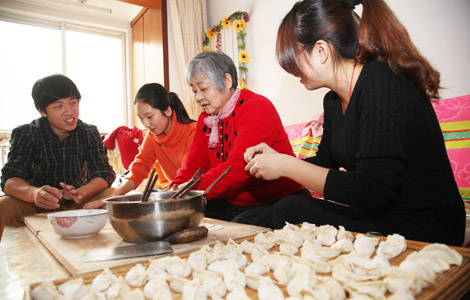
 Govt urged to take care of parents who lose child
Govt urged to take care of parents who lose child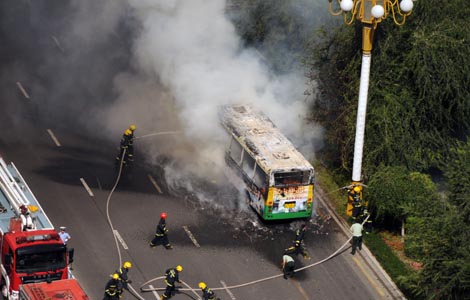
 1 dead, dozens injured in Urumqi bus fire
1 dead, dozens injured in Urumqi bus fire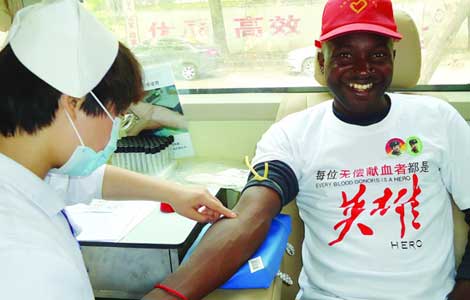
 Lei Feng's African brother
Lei Feng's African brother
 EU SMEs target niche markets in China
EU SMEs target niche markets in China
 British couple caring for special children
British couple caring for special children
 Fly for adventure at US air show
Fly for adventure at US air show
 Kobe Byrant meets fans in Shenzhen
Kobe Byrant meets fans in Shenzhen
Most Viewed
Editor's Picks

|

|

|

|

|

|
Today's Top News
Dialogue defuses EU, China solar case
Drifting left, Asian American voters still back John Liu
Beijing sincere on S China Sea Code of Conduct
Washington Post sold to Amazon's founder
Fonterra says sorry for 'anxiety'
Obesity rate on the increase
Detroit Symphony brings China to NYC
Service sector drives up growth
US Weekly

|

|




